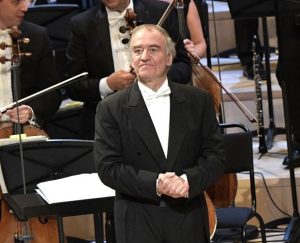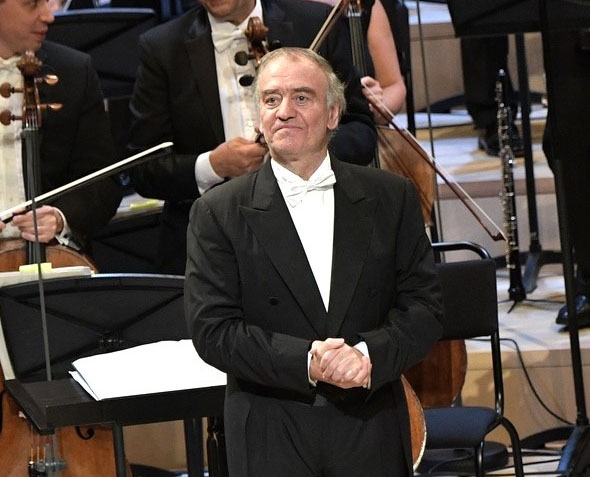
Artistic director of the Mariinsky Theatre Valery Gergiev at the opening of the Zaryadye Concert Hall. Photo: www.kremlin.ru
Since the war started, Ukraine has become a magnet for the global media. As the war has progressed, its voice has become stronger in cultural matters, too. Ukraine has emerged from the shadows of its murderous “brother” and thrust itself into the western imagination, bleeding, yet stoic, full of raw emotion. It stopped being “the Ukraine”. “Kiev” became “Kyiv.”
Western intellectuals and the public suddenly started browsing Wikipedia pages on Ukraine’s history, trying to dissect reasons for its obstinance in the face of the enemy.
The Russia-Ukraine war has many layers. It’s a war of democracy versus authoritarianism. It is a war of blatant propaganda versus principled journalism. It is also a classical colonial war of a metropolis against one of its former subjects. A liberation struggle, extending into the realm of history and culture.
There’s a growing consensus among Ukraine’s cultural elites that this war should become a point of no-return for Russia trying to impose its imperial blueprint on the perception of history and culture of this region, both domestically and internationally.
In the early days of the war, as the first Russian rockets hit the Ukrainian capital, Ukrainian Institute, a young state institution with a mandate to promote Ukraine’s standing in the world through cultural diplomacy instruments, published a manifesto, calling on international partners to stop cooperation with Russia’s state cultural institutions. Similar to weaning itself off Russian energy, the West needs to stop thoughtlessly consuming Russian cultural products, without contextualising them, the Institute said.
As Russian artillery pound Ukrainian cities, London’s leading museums continue feeding the narrative about great Russian culture and history to their audiences. “Fabergé in London: Romance to Revolution”opened at the V&A shortly before the invasion. It profiles “craftsmanship and luxury” of Carl Fabergé, the jeweller of the Russian imperial family. The backdrop of the story is Russia’s imperial history and close ties between both monarchies.
There has since been a pivot. British museums are suddenly showing more willingness towards giving Ukraine agency. London’s National Gallery reviewed its stance on a Degas canvas in its permanent collection, depicting a swirl of dancers in a distinctly Ukrainian traditional attire. “Russian Dancers” became “Ukrainian Dancers”. Tate Modern is currently working on a new exhibition project with Ukraine as its focus, the first of its kind in its history.
Ukraine’s cultural elites and scholars worldwide are determined to seize this moment and to shift the paradigm where imperial hierarchies persist. As it has stood the histories of big countries, mostly former empires, and their cultural figures and phenomena matter more than those of their colonial subjects. This explains why there are so few centres for Ukrainian Studies in the UK (Cambridge being the notable exception), so few translations of Ukrainian literature. No exhibitions in major museums, up until now.
“We cannot cancel Russian culture.” “Pushkin cannot be held responsible for Putin.” “We cannot exclude Russian artists from being invited to residencies and collaborative projects.” “It’s illiberal.” “It smacks of censorship.” These are the arguments often deployed by many intellectuals and creatives in the West. Let us address these concerns one by one.
Placing Russia at the centre of any cultural conversation should not happen without clear articulation of the fact that Russia has used culture for the purposes of aggressive political propaganda internationally. Culture is a broad reflection of the society it represents, and currently Russian society stands largely united behind an ideology promoting violence and blatant untruths.
The new consensus should go beyond the outcome of the Ukraine-Russia conflict and should be about realisation that cultural discourse is unfairly skewed in favour of big and powerful countries, denying many voice and agency. And Ukraine is not alone here.
Our perception of one’s culture is often shaped by a sheer fact of its presence on the cultural scene: through books, theatre productions, films and exhibitions. We often forget that there’s a powerful state machinery propping up this presence and that rogue states – and Russia has become one – weaponise culture and history to political ends, and even use them as a pretext to start a war. To be remembered, the Russian intent behind the killings in Ukraine is to “de-Nazify” the country.
Artists and academics often lack a toolkit to study and bring to the fore cultures previously absent from the discourse. These cultures are absent or underrepresented not for the reasons of uninteresting or lacking value. They are absent because of entrenched cultural hierarchies, intellectual laziness, lack of courage to work with original sources, as well as a long history of suppression of their culture and language by the metropolis.
It is intellectually dishonest and arrogant to place Ukrainian and “good” Russian artists on the same footing by inviting them to speak at the same panel discussion or to apply for funding, for the sake of “reconciliation” and “dialogue”. There can be no reconciliation while the war is still on. It can only start happening after Russia has admitted its guilt and paid reparations for the damage done. Any other framework would mean perpetuation of the colonial discourse.
This article appears in the forthcoming summer 2022 edition of Index on Censorship. Get ahead of the game and take out a subscription with a 30% discount from Exact Editions using the promo code Battle4Ukraine.





